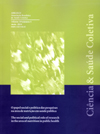1457/2013 - Risk dietary patterns for non-communicable chronic diseases and its association with body fat - A Systematic Review.
Padrão alimentar de risco para as doenças crônicas não transmissíveis e sua associação com a gordura corporal – Uma Revisão Sistemática.
Author:
• Edynara Cristiane de Castro Azevedo - Azevedo, E. C. C. - Programa de Pós-Graduação em Nutrição - Universidade Federal de Pernambuco (UFPE) - <edy_azevedo@hotmail.com >Co-author(s):
• Alcides da Silva Diniz - Diniz, A.S. - Programa de Pós-Graduação em Nutrição - Universidade Federal de Pernambuco (UFPE) - <diniz.alcides@hotmail.com>• Jailma Santos Monteiro - Monteiro, J.S. - Departamento de Nutrição - Universidade Federal de Pernambuco (UFPE) - <jailma03@yahoo.com.br>
• Poliana Coelho Cabral - Cabral, P. C. - Programa de Pós-Graduação em Nutrição - Universidade Federal de Pernambuco (UFPE) - <poliana.cabral@ufpe.br>
ORCID: https://orcid.org/0000-0002-2709-4823
Thematic Area:
Alimentação, Nutrição e SaúdeAbstract:
Objective: To review studies on unhealthy eating patterns for non-communicable chronic diseases (DCNT) and its association with body fat in adults, published between 2005 and 2012.Methods: The articles were systematically reviewed by two independent researchers in Medline, Lilacs, and Scielo using as key terms: food consumption, chronic diseases, anthropometry, body fat, and adults. Eight studies met the inclusion criteria, all performed in the Brazilian population.
Results: The prevalence of overweight and abdominal fat ranged38.6% to 51.3% and 23.4% to 43.1%, respectively. In most studies, fruit and vegetables consumption was below recommended. A significant association between food patterns and anthropometric profile was found in five studies.
Conclusion: The variations in the prevalence and in the results of the studies indicate the need of standardization of data collection instruments and methods used as well as the performance of studies with more appropriate design. The high prevalence of overweight and low consumption of health food indicates the need of intervention measures that reduce the exposure to unhealthy food consumption for the development of DCNT.











